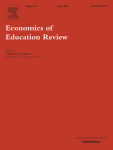Late-childhood foundational cognitive skills predict educational outcomes through adolescence and into young adulthood: evidence from Ethiopia and Peru
| Year | : | 2024 |
|---|---|---|
| Author/s | : | Jennifer López, Jere R. Behrman, Santiago Cueto, Marta Favara, Alan Sanchez |
| Area/s | : | Education and learning |
López, J., Behrman, J.R., Cueto, S., Favara, M. & Sanchez, A. (2024). Late-childhood foundational cognitive skills predict educational outcomes through adolescence and into young adulthood: evidence from Ethiopia and Peru. Economics of Education Review, 100, 102543. https://doi.org/10.1016/j.econedurev.2024.102543
We estimate associations between foundational cognitive skills (inhibitory control, working memory, long-term memory, and implicit learning) measured at age 12 and educational outcomes measured at ages 15 and 19–20 in Ethiopia and Peru, using the Young Lives data. The estimates adjust for rich sets of controls and include measurements of children’s baseline abilities. For a subset of the outcomes, we exploit within-household variation. Working memory and long-term memory are consistently and positively associated with subsequent domain-specific cognitive achievement tests (measuring specifically numeracy, vocabulary and literacy achievement) in both countries, university enrolment in Peru (long-term memory) and lower secondary-school completion in Ethiopia (working memory). Inhibitory control predicts subsequent math-test scores in both countries, grade attainment (Ethiopia), and university enrolment (Peru). Value-added estimates show that these skills play roles during adolescence, with the memory-related skills predicting higher domain-specific test scores (Peru and Ethiopia) and grade attainment (Ethiopia), while inhibitory control has associations with math (both countries). These results provide additional evidence to justify the importance of promoting investments in cognitive skills throughout childhood and adolescence, and elucidate how such investments impact educational achievements.







